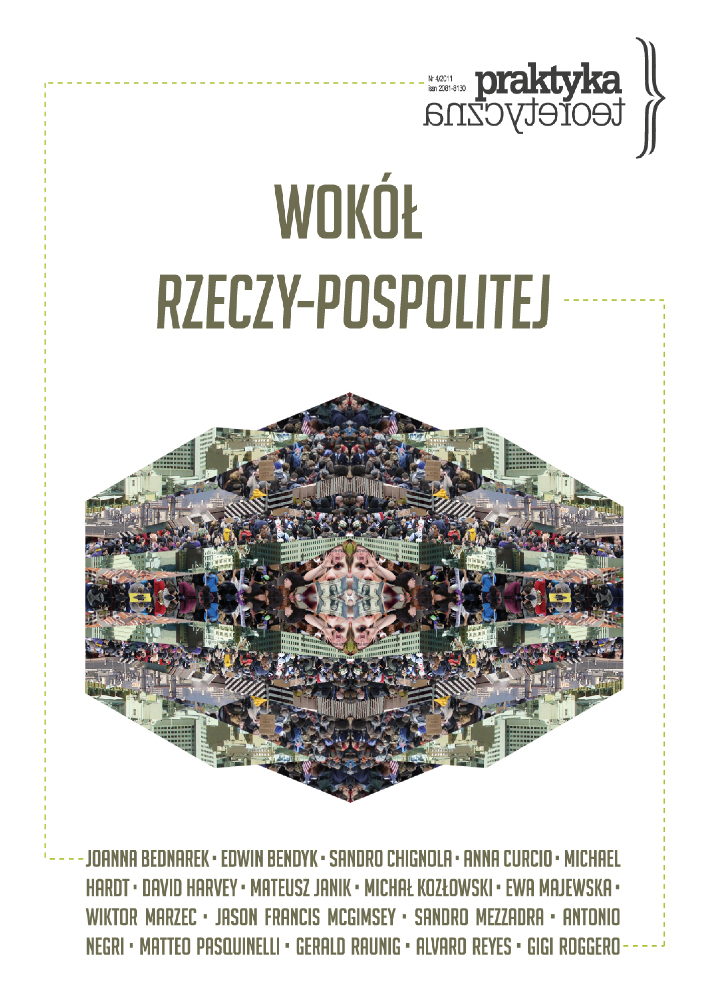Abstract
In the last part of the Empire trilogy, Commonwealth, Negri and Hardt ask about the possibility of the self-governance of the multitude. When answering, they argue that absolute democracy, understood as the political articulation of the multitude that does not entail its unification (construction of the people) is possible. As Negri states, this way of thinking about political articulation is rooted in the tradition of democratic materialism and constitutes the alternative to the dominant current of modern political philosophy that identifies political power with sovereignty. The multitude organizes itself politically by means of the constitutive power, identical with the ontological creativity or productivity of the multitude. To state the problem of political organization means to state the problem of class composition: political democracy is at the same time economic democracy.
References
Badiou A. 2006. Metapolitics. New York-London: Verso.
Badiou A., F. Luchesse, J. Smith. 2011. We Need a Popular Discipline. http://www.lacan.com/baddiscipline.html.
Balibar É. 2009. Spinoza i polityka. Warszawa: Wydawnictwo Naukowe PWN.
Casarino C. 2003. “Time Matters: Marx. Negri. Agamben. and the Corporeal”. Strategies 16 (2) : 185-206.
Deleuze G. 1990. Expressionism in Philosophy: Spinoza. New York: Zone Books.
Deleuze G. 1997. Różnica i powtórzenie. Warszawa: Wydawnictwo KR.
Hardt M., Negri A. 2004. Multitude. London: Penguin Books.
Hardt M., Negri A. 2005. Imperium. Warszawa: W.A.B.
Hardt M., Negri A. 2009. Commonwealth. Cambridge: Harvard University Press.
Hardt M. 2007. Into the Factory: Negri’s Lenin and the Subjective Caesura (1968-1973). W The Philosophy of Antonio Negri Vol. 2. London: Pluto Press.
Harman C. 2011. Kapitalizm zombie: globalny kryzys i aktualność myśli Marksa. Warszawa: Muza.
Harvey D. 2008. Neoliberalizm: historia katastrofy. Warszawa: Książka i Prasa.
Hobbes T. 2007. Lewiatan. czyli materia. forma i władza państwa świeckiego. Warszawa: Fundacja Aletheia.
Rousseau J. J. Umowa społeczna. Kęty: Wydawnictwo Marek Derewiecki.
Husson M. 2011. Kapitalizm bez znieczulenia. Warszawa: Bractwo Trojka.
Illuminati. A. 2010. Recent Italian Translations of Althusser’s Texts on Aleatory Materialism. http://www.borderlands.net.au/vol4no2_2005/illuminati_transl.html
Locke J. 1992. Drugi traktat o rządzie. W Dwa traktaty o rządzie. Warszawa: Wydawnictwo Naukowe PWN.
Macherey P. 1996. The Encounter with Spinoza. W Deleuze: a Critical Reader. Oxford-Malden MA.
Macherey P. 2005. Negri’s Spinoza: From Mediation to Constitution. W The Philosophy of Antonio Negri. Vol. 1: Resistance in Practice. London: Pluto Press.
Machiavelli N. 1984. Książę. Warszawa: Wydawnictwo Naukowe PWN.
Machiavelli N. 1984. Rozważania nad pierwszym dziesięcioksięgiem historii Rzymu Liwiusza. Warszawa: PIW.
Mouffe Ch. 2005. Paradoks demokracji. Wrocław: Wydawnictwo Naukowe Dolnośląskiej Szkoły Wyższej Edukacji TWP.
Mutman M. 2007. Difference. Event. Subject: Antonio Negri’s Political Theory as Postmodern Metaphysics. W The Philosophy of Antonio Negri. Vol. 2: Revolution in Theory. London.
Negri A. 1991. Marx beyond Marx: Lessons on the “Grundrisse”. New York: Pluto Press.
Negri A. 1991. The Savage Anomaly: the Power of Spinoza’s Metaphysic and Politics. Minneapolis-Oxford: University of Minnesota Press.
Negri A. 1999. Insurgencies: Consituent Power and the Modern State. Minneapolis: University of Minnesota Press.
Negri A. 2003. The Constitution of Time. W Time for Revolution. New York-London.
Negri A. 2011. “Hiszpańskie refleksje”. Bez Dogmatu 89 (3) : 6-10.
Negri A., J. Revel. 2011. Dobro wspólne w rewolcie. http://www.ha.art.pl/prezentacje/39-edufactory/1963-judith-revel-antonio-negri-dobro-wspolne-w-rewolcie.html.
Spinoza B. 2000. Traktat o poprawie rozumu. W Traktaty. Kęty: Wydawnictwo Marek Derewiecki.
Tronti M. 2010. The Strategy of Refusal. http://www.geocities.com/cordobakaf/tronti_refusal.html
Žižek S. 2007. „Obiekt a jako wewnętrzna granica kapitalizmu”. Krytyka Polityczna 11-12 (1-2) : 264-273.
License
“Theoretical Practice” seeks to put into practice the idea of open access to knowledge and broadening the domain of the commons. It serves the development of science, thinking and critical reflection. The journal is published in open-access mode under the CC-BY-NC-SA 4.0 license (detail available here: http://creativecommons.org/licenses/by-nc-sa/4.0/). Articles published in the journal may be freely distributed, stored, printed and utilized for academic and teaching purposes without restrictions.
They should not be, however, used for any commercial purposes or be reconstructed into derivative creations. Access to the journal may not be limited or offered for a fee by any third party.
Prospective authors are obliged to fill in, sign and send back the publishing contract compliant with the CC licencing. [PL.pdf, PL.doc, EN.pdf,EN.doc].
According to this contract, authors grant the journal a non-exclusive right to publish their work under the creative commons license (CC-BY-NC-SA 4.0) without any financial obligation on both sides of the contract.
Before submission authors should make sure that derivative materials they use are not protected by copyright preventing their non-commercial publication. Authors are responsible for any respective copyright violations.
